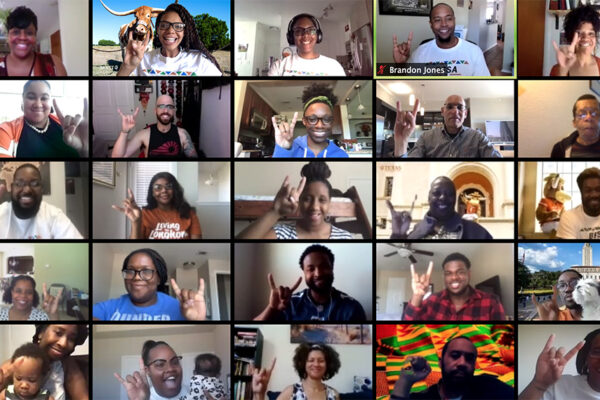COVID-19 quarantines might have taken away the food and in-person fun, but the sense of community is still there. Women’s Empowerment Chats for UT Staff and Faculty of Color and the Black Faculty and Staff Association have been providing space and support for Black employees at the university for two and 30 years, respectively. There was no way a pandemic, and the move to online meetings, was going to stop them.
Only 4.6% of UT’s tenured and tenure-track faculty members and 6.7% of staff members identify as Black, according to a 2019 UT survey, and with a campus that has grown beyond the Forty Acres, Black faculty and staff members are spread out. Shauna T. Sobers, the founder of Women’s Empowerment Chats for UT Staff and Faculty of Color and assistant director of residence life for University Housing and Dining, says being the only Black person or woman in a department can feel isolating.
“There may be other people who share your intersection of identity across campus, but if you don’t know them, that can impact your experience just as much as it does for our students,” she says.
Now that many UT operations have moved online, seeing fellow Black staff and faculty members on a regular basis can be even more difficult. And so, the BFSA and Women’s Empowerment Chats meetings continue virtually.
“Coming to such a large campus where there’s not a lot of folks that look like us, it’s good to have that space where you can come and see people that look like you and see people who have done the things that you want to do,” says Payton Anderson, BFSA co-president and associate academic adviser for the McCombs School of Business.
Sobers, who has a doctoral degree in higher education administration and leadership from the University of the Pacific, founded Women’s Empowerment Chats for UT Staff and Faculty of Color as a product of her research on the resilience of Black women in executive leadership positions. Her findings showed that one component of these women’s successes was their ability to surround themselves with peers and mentors going through a similar experience.
By summer 2018, Sobers realized she wanted to provide that support for UT Student Affairs staff members.
(We look) at it from the lens of, ‘How does this impact me as a Black person and how do I as faculty or staff go out and use this information to help Black students on campus?
The group first materialized as a monthly brown bag lunch. Without a set meeting space, the group would congregate in the Texas Union, a residence hall lobby or a study lounge.
Soon enough, Soncia Reagins-Lilly, vice president for student affairs and dean of students, took notice of the monthly meetings and wanted to support the initiative. Instead of meeting across campus, Sobers and her cohort of women could meet in the VPSA’s conference suite.
With help from Marilyn Tyus, assistant vice president for University Housing and Dining, the Division of Diversity and Community Engagement and Lilly, brown bag lunches became funded meals.
As the number of attendees began to grow, so did the bounds of the organization. Organically, members started to attend from all across campus, not just the Student Affairs division. New members started popping up from the law school, the engineering school and more. Staff members brought their graduate students to participate, and faculty members began to join.
With more members came more feedback. After members suggested having a keynote speaker come address the group, Sobers arranged for a UT woman in an executive role to speak on a semesterly basis.
This past summer, members also asked for more frequent meetings via video call. Now Women’s Empowerment Chats meets on a biweekly basis to discuss topics prompted by Sobers. Sometimes it’s a discussion prompted in response to a video clip or article; other times, it’s sharing resources.
Anderson and fellow BFSA co-president Darius Jones, assistant director for sorority and fraternity life, are also continuing their monthly meetings — and three-decade legacy — virtually. There, they discuss anything from the importance of voting to Title IX through a Black perspective.
“Even if it’s just talking about general things that you hear about every day or in other spaces, (we look) at it from the lens of, ‘How does this impact me as a Black person and how do I as faculty or staff go out and use this information to help Black students on campus?’” Anderson says.
During the summer, amid nationwide protests prompted by the killings of George Floyd, Breonna Taylor and others, the organization provided space for members to vent and discuss mental health. Its mission — to advocate progress for Black staff and faculty members — was unchanged, but it did become more visible to the university, Anderson says.
“We’ve been able to meet with President Jay Hartzell to talk about some of these needs from our community and inform him about the perspective from Black faculty and staff members on what they need to thrive in this community and everything that’s already happening in the world,” Jones says.




